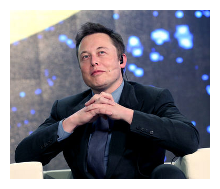Elon Musk Sells Google a Piece of Space-X
Remember the last story on the ubiquitous WiFi Internet last week? Check THIS out!
Google, Fidelity invest $1 billion in SpaceX and satellite Internet plan [Updated]
 Ars Technica – By: Megan Geuss – “Update: SpaceX confirmed that it had received $1 billion in funding from Google and Fidelity Investments. The two companies will together own slightly less than 10 percent of the company. “This funding will be used to support continued innovation in the areas of space transport, reusability, and satellite manufacturing,’ SpaceX said in a short statement on its website.
Ars Technica – By: Megan Geuss – “Update: SpaceX confirmed that it had received $1 billion in funding from Google and Fidelity Investments. The two companies will together own slightly less than 10 percent of the company. “This funding will be used to support continued innovation in the areas of space transport, reusability, and satellite manufacturing,’ SpaceX said in a short statement on its website.
Speaking to Ars, a Google spokesperson added, ‘Space-based applications, like imaging satellites, can help people more easily access important information, so we’re excited to support SpaceX’s growth as it develops new launch technologies.’
Ars has contacted Fidelity for a statement and will update if we receive a response.
Original story: The Information reported on Monday that, according to ‘several people familiar with the talks,’ Google is considering investing in SpaceX to support its plan to deliver hundreds or thousands of micro satellites into a low (750 mile) orbit around the globe to serve Internet to rural and developing areas of the world. The Information’s sources indicated that Google was in the ‘final stages’ of investing in SpaceX and valued the company at ‘north of $10 billion.’ SpaceX is apparently courting other investors as well.
Ars has contacted both SpaceX and Google for comment and will update when we receive a response.
Musk on Friday told a gathering in Seattle that SpaceX’s new office in that city would be dedicated to this satellite Internet service. Musk’s announcement came just days after another competing satellite Internet company, OneWeb, announced its own investments from Richard Branson’s Virgin Group as well as Qualcomm.
Both companies are in the early stages of developing their services, but they have key differences: Musk insists that his micro-satellite design is more sophisticated than that of Greg Wyler, the founder and CEO of OneWeb. But OneWeb grew out of O3b, a micro-satellite venture that Google invested more than $1 billion into. When Wyler left O3b, he brought with him the rights to the radio frequency the satellites would need to beam Internet back to Earth, courtesy of the International Telecommunications Union.
‘The Wyler-Google breakup left Google in the lurch, without the spectrum it needed for its project,’ The Information explained. When Wyler went rogue, Google started looking elsewhere to back a satellite Internet venture, since the industry is expected to yield dividends for early investors. ‘Google CEO Larry Page and Mr. Musk, who are close friends, began discussing an investment in SpaceX,’ the site reported.
The Information added another interesting tidbit that was not widely reported in previous discussions of SpaceX’s plans for global Internet service: ‘Mr. Musk appears to be trying to get around his lack of spectrum rights by relying, in part, on optical lasers.’ Musk has justified his project, which is expected to cost about $10 billion and take five years at a minimum to build, as a way of eventually serving Internet to his planned colony on Mars.
Google has been aggressive about experimenting with ways of making the Internet better and available in more places. Its Google Fiber initiative has seen some success since its inception in 2012, and it has caused traditional telecommunications providers to rankle in Google’s gigabit-wake. Google has also experimented with delivering Internet to rural and underserved areas via giant balloons, which Ars decided in 2013 was not a totally crazy idea.”